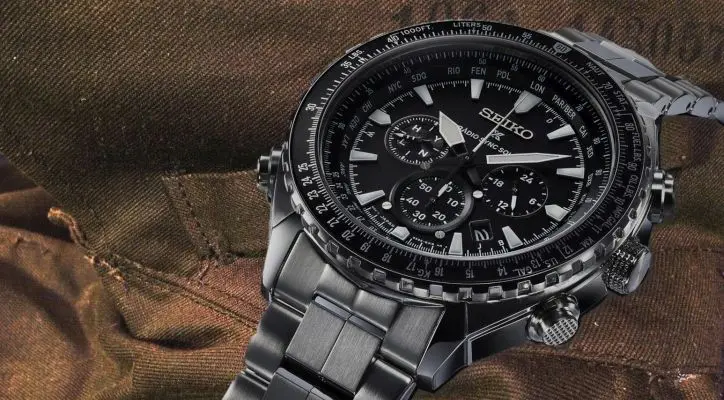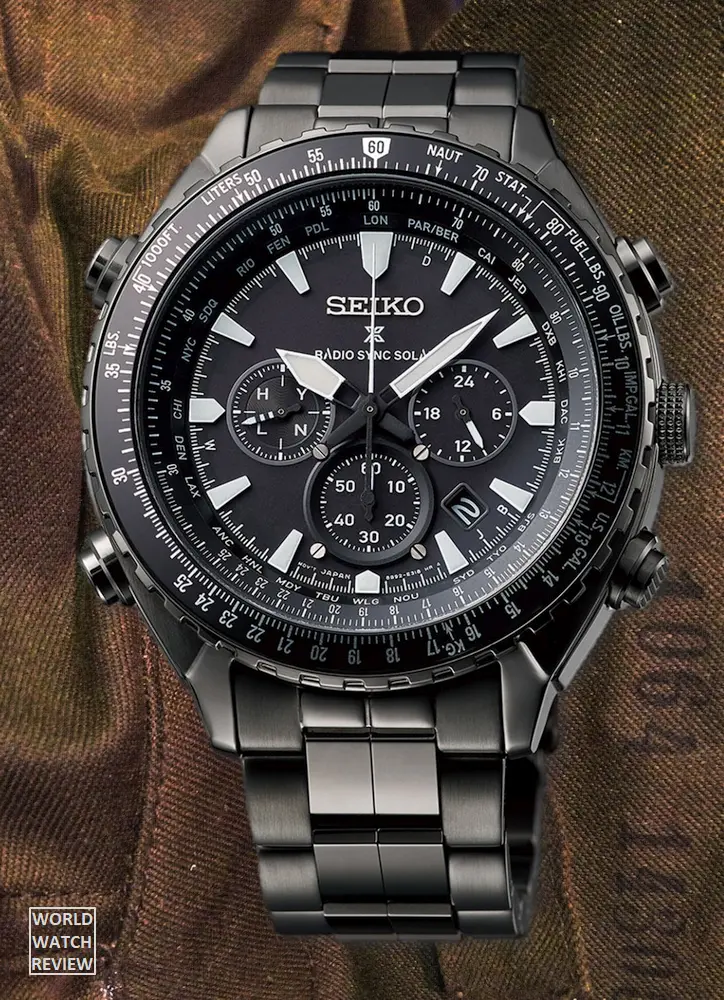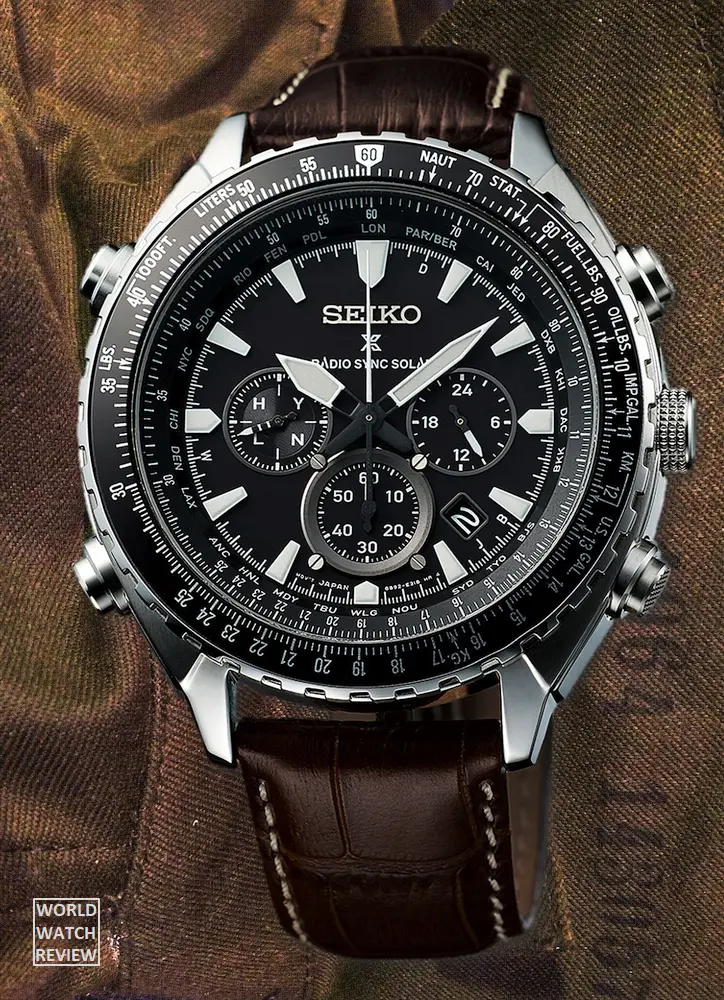
The 2016 PROSPEX Radio Sync Solar World Time Chronograph features exterior design cues similar to other “aviators” released by Seiko during the last five or six years (those including not only relatively expensive members of their higher-range Prospex family like this ref. SSC279, but also a lot more affordable ones like their older SND253P1).
The chronograph is available in three different finishes fully covering the niche of XXL-sized timekeepers designed with the price-conscious public in mind. While a lot of prospective customers will only wince looking at this 48 mm monster, I am sure that the model will be successful in the long run. I mean, look at this watch! This watch is amazing!
Overall Impression
Seiko’s premium Prospex line may not be as outright gorgeous as their significantly more upscale Ananta family, but it still does a good job at delivering you timekeepers that somehow manage to combine good industrial design, modern tech, and, of course, relatively low price.
In most cases, members of the collection easily trump their Swiss-made rivals in the same price category both in terms of looks and features. You usually need just a single glance to see that these timekeepers emanate a strong aura of style and even mojo.
This new Radio Sync Solar World Time Chronograph is definitely no exception here. Its steel body is well sculpted and is sophisticated enough to make even a lot more expensive chronographs from Breitling walk away in shame. Its deliberately crudely brushed surfaces are accented with mirror-polished once not only on the case itself but also on its stock bracelet. The bezel, as well as the setting crown and other control elements, are nicely proportioned and, although I see some minor ergonomics issues here and there, successfully combine good looks and ease of operation.
Even the busy dial is not that terrible after a couple of days of use. As the French put it curtly, noblesse oblige: this is a pilot’s watch, it is supposed to be as busy as a Boeing 747’s pilot’s cabin!
Overall, this member of the Prospex family leaves a strong impression if you factor out its outrageous size, which is a personal preference and I am pretty sure that there will be tens of thousands of happy customers who will buy this stainless steel Godzilla and ask for more.

The Case & Strap
With this new model, Seiko pronounces a well-articulated “F.U.” statement to the current trend of downsizing even the sportiest of watches. The chronograph boasts a huge steel case of almost 48 millimeters in diameter. Add here the set of long horns and you get an accessory that will only look good on an overweight or muscular person: it is that big. Of course, the styling also seriously limits the choice of attire you can wear it with.
Otherwise, the device looks gorgeous, especially the reference SSG003 that has its stainless steel case further protected from occasional scratches with dark high-carbon treatment: the finish makes the well-sculpted case look even more appealing and, well, three-dimensional.
As far as ergonomics goes, the notched bi-directional rotating bezel with an inevitable logarithmic slide rule that lets you easily convert distances, fuel load, weight, and speed from Imperial to Metric system (more of a gimmick in our age, but still a nice one) offers good grip and is comfortable to operate in most conditions.
The four push-pieces on both sides of the case don’t look that convenient, though, offering relatively short travel when pushed: some may find that not really comfortable.
The same goes for the setting crown that looks a bit too short to my taste. Seiko is proud to have the push-pieces sporting different top surfaces that, in their opinion, will make using the buttons more intuitive.
Still, it looks more like a sort of pleonasm to me: I don’t think that I need some extra clues to tell a pusher at two o’clock from a similar control at four o’clock, do I? I mean, seriously: the former is above the crown and the latter is below the darn thing, why would I need some extra help with the little buggers, huh?
The choice of straps is, as usual, not really impressive. There is a pair of steel bracelets (plain brushed steel for ref. SSG001 and matching darkened steel for ref. SSG003) and a single calf leather strap with contrasting stitching for ref. SSG005. A mesh steel bracelet and Cordura strap would also look nice here, but, well, I think you would be better off buying one from a third-party retailer.
The official water resistance rating for this piece is poultry 10 BAR (100 meters or approximately 330 ft.) While it is not advisable to abuse it with extreme water activities, the case will be okay if used for showering and even swimming. Just don’t forget to rinse it with fresh water to remove salt and fine sand that could damage the steel body over a long distance.
The Dial
As is often the case when it comes to watches designed with aviators in mind, the face of this new PROSPEX Radio Sync Solar World Time Chronograph is predictably cramped. Surprisingly though, it is deliberately busy without actually giving you much data. I mean, look at the dial. There are the usual hours, minutes, and small seconds indicators; a second time-zone sub-dial at 3 hours; a 60-minute chronograph at 6 o’clock, as well as a central chronograph seconds hand, and a small (like, really small) date aperture between four and five hour-markers. There are just four data sources that somehow manage to completely overwhelm a stunned observer.

The reason behind that is the monochromatic color scheme used for the dial, as well as the failure to put enough visual emphasis on the most important indicators. The rotating slide rule on the bezel itself and the bezel flange placed behind the usual Hardlex crystal, too, helped to make the dial as difficult to read as it is.
Of course, it will not take you much time to adapt to your new time-measuring accessory, but those will be painful moments of your life.
Well, given the amount of Lumibrite luminous compound the Japanese brand has generously applied not only to hours and minutes indicators but also to oversized hour markers, as well as to small seconds and GMT indicator pointers, nighttime legibility will not be a problem.
The Mechanism
Of course, behind this extensive list of functions, there must be a formidable engine to make things work. In this particular case, it is their new Caliber 8B92 electronic movement. Featuring solar charging, the movement will probably never require you to change the original battery if you expose it often enough to natural or artificial light. Yes, the battery may degrade beyond repair eventually, but I have the impression that the mechanism will wear out a lot sooner.
As most of you will probably agree, it is not commercially feasible to use a high-precision quartz caliber in a relatively inexpensive watch (it will retail at around €700 in Europe when finally available) and, although there is still not enough information regarding the mechanism, the official specification that accompanied the press release gives us a hint that, predictably, in terms of accuracy this caliber sucks a great deal.
It may be not fair to compare this modest workhorse with Seiko’s gorgeous Caliber 9F family of quartz mechanisms that blows out of the water even the whole well-advertised ETA Thermoline range that Breitling loves so much, but, sans electronic crutches, it displays a sort of average performance. I mean, for a quartz mechanism, the accuracy of +/- 15 seconds per month is not something to brag about.
However, the mechanism’s inherent flaws are compensated with modern technology. Although the electronic module can’t receive signal from GPS satellites like this Astron GPS Stratosphere SAS033, for example, it is still able to periodically check its readings against one of many stations in Japan, United States, Germany and China broadcasting signal of super-precise atomic clocks around the world.
As long as are within the range of coverage, you should not worry about missing that plane: Seiko proudly states that, with the assistance of its multiband technology, the movement is precise enough to gain or lose no more than a second every 100,000 although I somehow doubt that the gadget will last that long.
The Pricing & Availability
Announced earlier this year, the watch will go on sale only in August 2016 and, unlike many of their JDM-reserved models, will be available all over the world including the European Union where it will feature an ‘approximate’ MSRP of €640 for the version on a leather strap and up to €730 for the one in hardened stainless steel.
The price seems to be about right given its set of functions that includes continuous solar charging and radio syncing. Also, there are not so many competing products that would combine the features with the gargantuan size of this thing, so, again, the price does look competitive and will be even more so when the Radio Sync Solar World Time Chronographs finally hit online stores. You just need to be patient to get the best of them.
I think the only thing that I really don’t like about this model is the dreadful “MOV’T JAPAN” inscription at 6 o’clock. The inscription means that, while the mechanism is made in Japan, the watch itself is assembled anywhere, but the Land of the Rising Sun. Something tells me that “anywhere” in this particular means that it is neither the United States nor Switzerland. However, if you don’t mind paying around Euro 700 for a watch made in the world’s cost-cutting powerhouse, buying one of these oversized beauties may be a good choice as well as you buy it with a full warranty and service.
We at worldwatchreview.com here think that it would look nice with full-grain leather boots, a waxed cotton motorcycle jacket, and some aggressive-looking V-Twin cruiser, like this mean and lean 2016 Ducati XDiavel.
See also: Alba by Seiko Canteen AXHK21X
Photos: Seiko
WWR verdict
Originality 4/5
Build quality: 5/5
Usability: 4.5/5
Legibility: 3.5/5
Value for money: 4.5/5
Seiko PROSPEX Radio Sync Solar World Time Chronograph (refs. SSG001 / SSG003 / SSG005) specification
Price: €640-€700
Movement: Caliber 8B92, solar charging, radio syncing, Made in Japan
Power reserve: Virtually unlimited
Functions: Hours, minutes, seconds, world time (25 time zones,) chronograph, unit converter (rotary slide rule on the bezel, conversion of distance, fuel load, weight, and speed)
Case: Stainless steel (refs. SSG001, SSG005) / Stainless steel with black hard coating (SSG003)
Shape: Round
Size: 47.80 mm
Case height: 14.50 mm
Dial: Black
Hour markers: Luminous
Hands: Luminous
Water resistance: 100 meters
Strap: Stainless steel bracelet (SSG001) OR bracelet with black hard coating matching case (SSG003) on the three-fold clasp with push-button release and secure lock / Brown calf leather strap (SSG005)
Crystal: Hardlex, anti-reflective coating
Back: Solid
